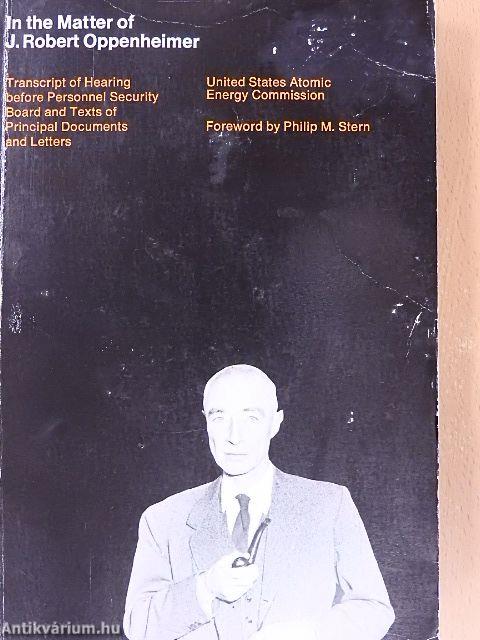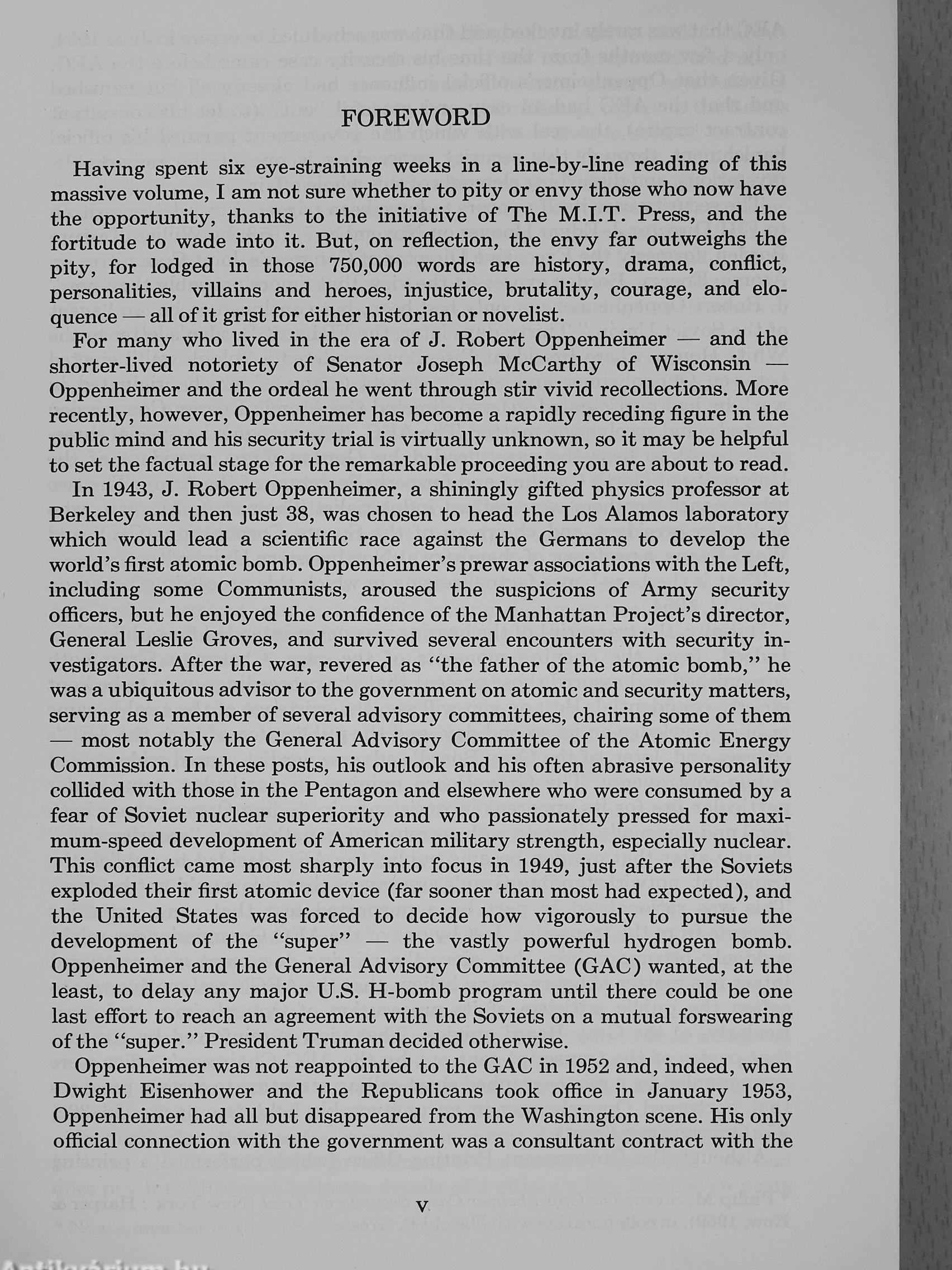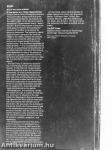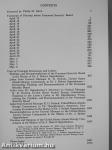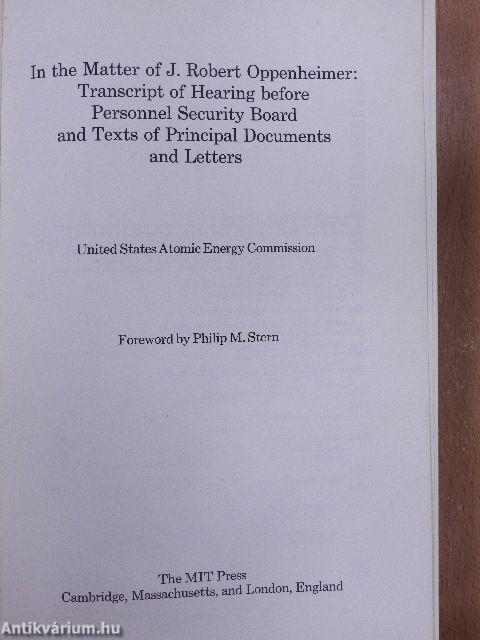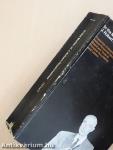1.067.317
kiadvánnyal nyújtjuk Magyarország legnagyobb antikvár könyv-kínálatát

VISSZA
A TETEJÉRE
JAVASLATOKÉszre-
vételek
In the Matter of J. Robert Oppenheimer
Transcript of Hearing before Personnel Security Board and Texts of Principal Documents and Letters/United States Atomic Energy Commission
| Kiadó: | The MIT Press |
|---|---|
| Kiadás helye: | Cambridge |
| Kiadás éve: | |
| Kötés típusa: | Varrott papírkötés |
| Oldalszám: | 1.084 oldal |
| Sorozatcím: | MIT |
| Kötetszám: | 161 |
| Nyelv: | Angol |
| Méret: | 23 cm x 15 cm |
| ISBN: | 0-262-71002-1 |
naponta értesítjük a beérkező friss
kiadványokról
naponta értesítjük a beérkező friss
kiadványokról
Előszó
TovábbFülszöveg
$5-95 ¦ i
MIT 161 POLITICAt SCIENCE
tn the Matter Of J. Robert Oppenheimer
United States Atomic EnergyCommlssion This publication brings back into print ' the complete testimony, as released by the AECin 1954, of the hearing called to determine If Oppenheimer was a "security rlsl<." But the Importance of the document goes far beyond the considered . question of whether to terminate his security clearance: The testimony spans Oppenheimer's personal life from the 192bs to the 1950s, reflects the broader political and scientific stjrrlngs of this period, and raises Issuqs that remain central today. The document develops all these themes — it is a compelling human portrait, an eyewitness history of some of the most Important events of the century, and a flashback to one of the points of origin of our present concerns with the ' arms race and government decision making, conscientious dissent and national loyalty.
The testimony is Inherently dramatic (as a recent play of the same... Tovább
Fülszöveg
$5-95 ¦ i
MIT 161 POLITICAt SCIENCE
tn the Matter Of J. Robert Oppenheimer
United States Atomic EnergyCommlssion This publication brings back into print ' the complete testimony, as released by the AECin 1954, of the hearing called to determine If Oppenheimer was a "security rlsl<." But the Importance of the document goes far beyond the considered . question of whether to terminate his security clearance: The testimony spans Oppenheimer's personal life from the 192bs to the 1950s, reflects the broader political and scientific stjrrlngs of this period, and raises Issuqs that remain central today. The document develops all these themes — it is a compelling human portrait, an eyewitness history of some of the most Important events of the century, and a flashback to one of the points of origin of our present concerns with the ' arms race and government decision making, conscientious dissent and national loyalty.
The testimony is Inherently dramatic (as a recent play of the same title has shown). In the title role, Oppenheimer reveals himself as a man of Hamletlike complexity, by turps humble and arrogant, naive and knowing, candid and reserved, witty and deadly serious. His final greatness makes itself felt in that . ioining of resignation to resolution with which he accepts the adverse outcome of his case-(to him, inevitable) and Its tragic implications for the nation. As background, the testimony carries the reader through a number of settings: the revolution in physics in the late 1920s; the depression, the rise of Nazism, the Spanish Civil War, and the American left's fascination with another sort of revolution; the war years, the building of the atomic bomb, and the decision to use it; the simultaneous opening of the U.N. and the Cold War, and the failure to bring atomic weapons under International control; and the heyday of McCarthyism with its patriotic hysteria, suspicion, and repression.
The abiding pertinence of this document is obvious. It is addressed to a nation loudly debating ABM and MIRV deployment, leftist politics, milltary-in-dustriai^govemmental power, the question of loyalty, the limits of dissent, and the right of a man to define for himself, in conscience, what the "national Interest" is or should be, as Oppenheimer did in opposing the creation of the hydrogen bomb.
Among those called to give witness in these matters are Fermi, von Neumann, Bethe, DuBridge, Rabi, Teller, Gen. Groves, McCloy, Li.li^nthai, Kar) Cpmp-ton. Bush, and Conant. For the first time, the transcript has been provided with an Index.
The MIT Press
Massachusetts Institute of Technology Cambridge, Massachusetts 02142
Photo by Alan W. Richards, Princeton, New Jersey Vissza
Témakörök
- Történelem > Legújabb kor
- Életrajz > Tudomány > Tudósok
- Idegennyelv > Idegennyelvű könyvek > Angol > Életrajz > Tudomány > Tudósok
- Idegennyelv > Idegennyelvű könyvek > Angol > Történelem > USA története
- Történelem > Életrajz > Egyéb
- Történelem > Idegennyelvű > Angol
- Történelem > Levelek, forráskiadványok, dokumentumok > XX-XXI. század
- Történelem > Kontinensek szerint > Amerika, amerikai országok története > Észak-Amerika
- Történelem > Legújabb kor > II. világháború > Egyéb
- Történelem > Legújabb kor > A hidegháború kora (1946-1991)
- Történelem > Politika > Politikai rendszerek
- Történelem > Hadtörténet > Fegyverek, fegyvernemek



